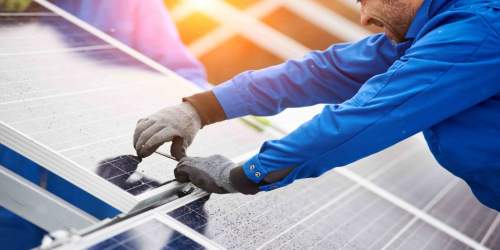Read Time : 4 Minutes
3kW Solar Panel Systems
About 3kW Solar Panel Systems
Although a 3kW solar PV system is under the widely accepted standard size system of around 4kW, you can still save money, make your home more energy efficient and generate an attractive pay-back period by installing a 3kW solar panel system. These systems tend to be ideal for small to medium sized homes that contain two or three people.
When you start looking into purchasing solar panels, there are a number of things that you should consider which we will detail out below. The likelihood is that you've arrived on this page due to a lack of space on your roof or simply a lower than average (3500 kWh/s PA) electricity demand. The good news is that a 3kW system can be more than sufficient.
COMPARE PRICES FROM LOCAL INSTALLERS
Compare prices from local companies fast & free
Enter your postcode to compare quotes from leading professionals. We promise to keep your information Safe & Secure. Privacy Policy
Here's a quick list of considerations:
Roof space: A solar PV installation is often dependent on the amount of space available for installation. For example, the 1kW and 2kW systems are the smallest options and are the most commonly found in smaller households. You can read more about the 2kW system here. The size of the solar panel system that your end up getting will be often be limited by the size of the roof on your house. A 3kW solar panel system does require a roof space of at least 21 square meters or more. Keep in mind that the larger the system you install, the more electricity will be generated.
Panel efficiency: The efficiency of a solar panel is based on the amount of sunlight reflected on a solar panel and what percent gets converted into electricity. Most solar panels claim efficiencies of 15-20%, generally speaking a higher efficiency panel can be expected to cost more. The type of panel, monocrystalline, polycrystalline or amorphous, the orientation, pitch of roof and shading, the average solar radiation in your part of the country and the general build of the panel will all effect efficiency. If roof space is an issue then less panels of a higher efficiency is often the best way to get the most out of the space you have. It's also worth mentioning that solar panels will lose efficiency over time. Check with your installation company and any manufacturers info for more details.
Remember to have your panels cleaned from time to time as a layer of dust or bird mess will lower panel output.
Location: The ideal position for the installation of the panels is on a south facing portion of the roof but east/west through south is considered usable. The optimal pitch of the roof is anything between 40 and 12 degrees and of course, the less shading the better.
Energy Consumption: The first step is to determine your average daily energy consumption in kilowatt-hours (kWh). You can find this information on your utility bills. As a quick guide, a 3kW system installed in optimal circumstances can generate up to 6-7kWh/s per day. This may not cover your needs but could go a good way towards subsidising your electrical consumption. Remember that you will need a battery system if you want to cover night time usage.
Energy Efficiency: Improving the energy efficiency of your property can reduce your overall energy consumption, making a 3kW system more sufficient. Consider energy-efficient appliances, improving insulation, and sealing any drafts to increase the overall efficiency of your property.
Smart Export Guarantee: If you have a smart meter and your panels are MCS certified and installed by an MCS accredited installation company, you can contact your energy provider and apply for the Smart Export Guarantee (SEG). Any excess energy generated by your solar panels can be fed back into the grid and you will receive a small payment in return. The tariff you are paid generally ranges between 3 and 7 pence per kW but Octopus is currently offering up to 15 ppkW which is getting a lot closer to fair. This can help offset energy needs during the night or on cloudy days. Alternatively, adding a battery storage system can store excess energy for later use. This is not the same as the Government's old Feed-in tariff which also paid a generation tariff on any electricity generated. Unfortunately, the FiT ended for new installations a long time ago.
Future needs: When sizing a PV system, you may want to consider your future energy requirements. If you expect your energy consumption to increase, you may want to install a larger solar panel system to accommodate this increase.
Budget: A 3kW system will be less expensive than a larger system making it a good option for those with a limited budget. Make sure you get a range of quotes, prices can vary dramatically. See our guide for getting solar panel quotes.
More on this below.
Carbon footprint: If your primary goal is to reduce your carbon footprint, a 3kW system will help significantly. The more electricity you generate from solar, the less you rely on fossil fuels.
Cost of 3kW Solar System
The price can vary, depending on the different solar panel types available to you as well as the amount of space that is being taken up. The more efficient the solar panels are; the more savings you will see in the long run. On the UK market, a 3kW solar panel system tends to range between £4,500 and £7,500. This figure includes the cost of installation. The best way to determine the cost is to speak to a professional installer about it. If you are thinking of investing, then we can cut down the time you spend on it, our directory of approved installation companies is available online, for free. Simply fill in our no-obligation form, and our expert installers will get back to you with the best deals available to you in your local area. It’s free, fast, and ethical.
Smart Export Guarantee (SEG)
When you start looking into investing in solar panels, the financial benefits that come with it are usually something that you take into serious consideration. The energy that is produced by the panels can not only help heat your home and power appliances, but it can also be sold back to your energy provider. Depending on your energy consumption, the larger the size of the installed system, the more energy can be produced and sold. The Smart Export Guarantee (SEG) is a rate that is agreed between yourself and energy company that is paid to you for the electricity you send back to them. The amount that is received depends on the tariff agreed and varies considerably from one energy provider to another, so it's advisable to shop around and compare offers before choosing a supplier for your renewable energy system. It's also subject to change, so ensure you have the latest information from your energy provider and check the government's official website for eligibility criteria.
The SEG aims to provide financial incentives for individuals and small businesses to invest in renewable energy systems by ensuring they are compensated for the surplus electricity they send back to the grid. Generally, the tariffs offered by energy companies is disapointingly low, you're paying 28-50 ppkWh (pence per kilo watt hour) these days yet the standard tariff for the electricity you send back is generally 3-7 ppkWh and all they're doing most likely is sending it to your next-door neighbour. That said, Octopus is offering up to 15p and others will likely follow suit.
The scheme was set up by the governent and requires energy companies to compensate property owners for the electricity they send to their supplier, it encourages the growth of distributed renewable energy generation and supports the UK's carbon reduction targets.
Advantages of the 3kW Solar Panel System
Over a period of time, a 3kW system will generate a pay-back period, giving you the peace of mind of having lower energy bills, protecting you from energy price increases, adding value to your property value and all whilst lowing carbon emissions. Although the pay-back period is likely to be longer than that of a larger system for those with average energy usage, it's still well worth investing in most cases. Generating a portion of your own power means that energy bills will be reduced over the foreseeable future, and so the investment will be earned back over a period of time
A 3kW solar panel system can be sufficient for some households, but it may not meet all energy needs for others. Ensure to assess your energy consumption, roof space and budget to determine if a 3kW system is the right choice or if you should consider a larger system. Consulting with us or a solar panel installation company in your area can help you make an informed decision.
Find a local installer
Welcome to the biggest directory of UK renewable energy companies





 How Much do Solar Panel Systems Cost in 2024?
How Much do Solar Panel Systems Cost in 2024?







